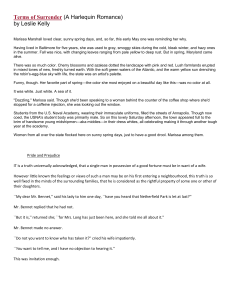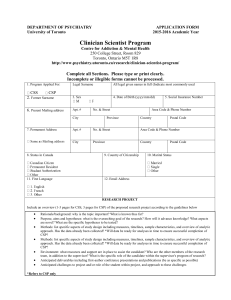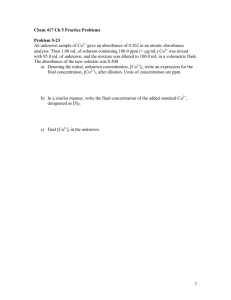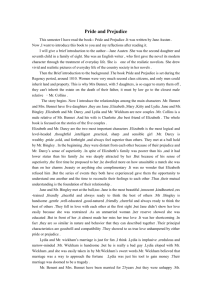Devin deBruyn, Best of Section C, Best Overall
advertisement
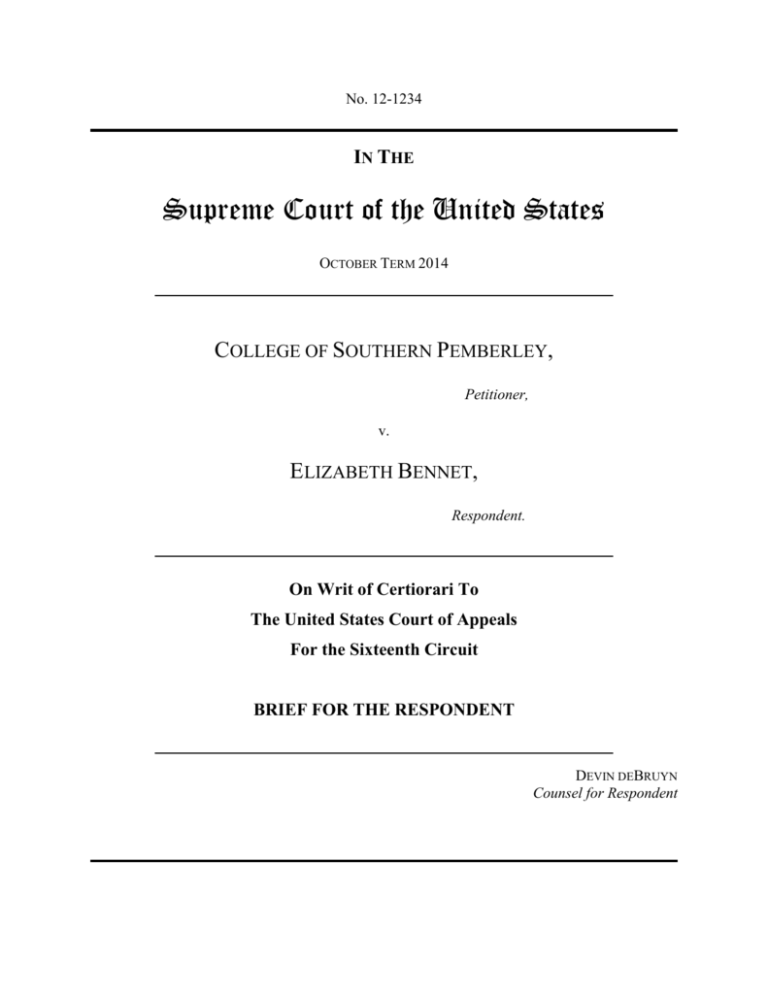
No. 12-1234 IN THE Supreme Court of the United States OCTOBER TERM 2014 COLLEGE OF SOUTHERN PEMBERLEY, Petitioner, v. ELIZABETH BENNET, Respondent. On Writ of Certiorari To The United States Court of Appeals For the Sixteenth Circuit BRIEF FOR THE RESPONDENT DEVIN DEBRUYN Counsel for Respondent QUESTIONS PRESENTED I. Are grades speech protected by the First Amendment? II. If so, does the doctrine of academic freedom extend to the university or the professor? i PARTIES TO THE PROCEEDING Petitioner, who was defendant-appellee below, is the College of Southern Pemberley (“CSP”). Respondent, who was plaintiff-appellant below, is Elizabeth Bennet. ii TABLE OF CONTENTS QUESTIONS PRESENTED ............................................................................................................ i PARTIES TO THE PROCEEDING ............................................................................................... ii TABLE OF AUTHORITIES ...........................................................................................................v CITATIONS TO THE OPINIONS BELOW ................................................................................ vi JURISDICTION ........................................................................................................................... vii STANDARD OF REVIEW .......................................................................................................... vii CONSTITUTIONAL PROVISIONS INVOLVED ...................................................................... vii STATEMENT OF THE CASE........................................................................................................1 SUMMARY OF THE ARGUMENTS ............................................................................................2 ARGUMENT ...................................................................................................................................4 I. GRADES ARE A FORM OF SYMBOLIC COMMUNICATION, AND THEREFORE THEY ARE A PROTECTED FORM OF SPEECH ..................................................................4 A. Grades are symbolic speech under this Court’s holding in Spence ............................................4 i. The First Prong: Grades communicate a particularized message .....................................5 ii. The Second Prong: A grade’s message will be understood by those who view it ..........6 iii. Parate extends the doctrine of symbolic communication to the academic setting ........6 B. Compelled speech is a violation of the First Amendment ..........................................................7 i. The First Amendment protects the right to select a message’s content ........................... 7 ii. Parate protected a professor from compelled speech......................................................8 II. BECAUSE ASSIGNING A GRADE IS SPEECH BELONGING TO THE PROFESSOR, SUCH AN ACT DESERVES PROTECTION UNDER THE DOCTRINE OF ACADEMIC FREEDOM .......................................................................................................9 A. The doctrine of academic freedom was abused by CSP, and if viewed in context clearly favors Bennet ............................................................................................................................................10 i. The policy behind the four essential freedoms concerns keeping academic pursuits free from restrictions ................................................................................................................11 iii ii. The four essential freedoms are rooted in academic grounds, and not collegiate athletics ..............................................................................................................................11 B. CSP failed to provide valid justification for interfering with Bennet’s speech ........................12 C. The present case is distinguishable from cases where the courts have held that public employees speak as proxies of their employers .............................................................................13 CONCLUSION ..............................................................................................................................15 PRAYER ........................................................................................................................................16 CERTIFICATE OF SERVICE ......................................................................................................16 iv TABLE OF AUTHORITIES Constitutional Provisions Page(s) U.S. CONST. amend. I ......................................................................................................................2 U.S. CONST. amend. XIV, § 1 ..........................................................................................................2 Statutes 42 U.S.C.A. § 1983 ..........................................................................................................................2 Federal Cases Bd. of Curators of Univ. of Mo. v. Horowitz 435 U.S. 78 (1978) ......................................................................................................................15 Brown v. Armenti 247 F.3d 69 (3rd Cir. 2001) ........................................................................................................14 Hurley v. Irish-Am. Gay 515 U.S. 557 (1995) ......................................................................................................................7 Keyishian v. Bd. of Regents 385 U.S. 589 (1967) ......................................................................................................................9 Miami Herald Pub. Co., Div. of Knight Newspapers, Inc. v. Tornillo 418 U.S. 241 (1974) ......................................................................................................................7 Pac. Gas & Elec. Co. v. Pub. Util. Comm. 475 U.S. 1 (1986) ..........................................................................................................................7 Parate v. Isibor 868 F.2d 821 (6th Cir. 1989) ..........................................................................4, 6, 7, 8, 12, 13, 15 Pickering v. Bd. of Educ. 391 U.S. 563 (1968) ..............................................................................................................12, 13 Spence v. Washington 418 U.S. 405 (1974) ..............................................................................................................4, 5, 6 Sweezy v. New Hampshire 354 U.S. 234 (1957) ................................................................................................4, 9, 10, 11, 14 v Wooley v. Maynard 430 U.S. 705 (1977) ......................................................................................................................4 Citations to the Opinions Below Bennet v. Coll. Of S. Pemberley (S.D. Pemberley 2013) R. 2 Bennet v. Coll. Of S. Pemberley (16th Cir. 2013) R. 17 vi JURISDICTION The court of appeals entered judgment on June 5, 2014. R. 21. Petitioner filed its Petition for Writ of Certiorari on June 24, 2014. R. 23. This Court granted the petition on October 15, 2014. R. 24. This Court’s jurisdiction rests on 28 U.S.C. § 1254(1) (2012). STANDARD OF REVIEW A district court’s fact findings and the reasonable inferences to be drawn from them are reviewed for clear error. Its legal conclusions are reviewed de novo. CONSTITUTIONAL PROVISIONS INVOLVED The First Amendment to the United States Constitution provides in pertinent part: Congress shall make no law respecting an establishment of religion, or prohibiting the free exercise thereof; or abridging the freedom of speech, or of the press; or the right of the people peaceably to assemble, and to petition the government for a redress of grievances. U.S. CONST. amend. I The Fourteenth Amendment to the United States Constitution provides in pertinent part: All persons born or naturalized in the United States, and subject to the jurisdiction thereof, are citizens of the United States and of the state wherein they reside. No state shall make or enforce any law which shall abridge the privileges or immunities of citizens of the United States; nor shall any state deprive any person of life, liberty, or property, without due process of law; nor deny to any person within its jurisdiction the equal protection of the laws. U.S. CONST. amend. XIV, § 1 vii STATEMENT OF THE CASE After earning her Ph.D. in English literature, Elizabeth Bennet was hired by the College of Southern Pemberley beginning the fall semester of 2008. R. 3. Bennet quickly endeared herself to students, who nominated her for teaching awards in 2009 and 2010, before winning the award in 2011. R. 3. The fact that Bennet’s class on author Jane Austen became the most popular course at CSP reflects her popularity as a professor and aptitude for teaching. R. 3. In the spring of 2013, Bennet’s Jane Austen class included a student-athlete, Mr. Wickham, who transferred to CSP in the fall and joined the school basketball team. R. 3. Wickham’s athletic ability propelled the team to several achievements, including an invitation to a national tournament. R. 3. Outside of Bennet’s classroom, Wickham and CSP garnered unfavorable media attention. The local newspaper reported that Wickham was compensated in special treatment by CSP. Wickham was handed senior-only housing, excused from two midterms and the school dean ordered all of his absences excused, including the ones unrelated to the basketball team. R. 3. Wickham’s exemplary athleticism was countervailed by poor academic performance. Wickham missed more than half of Bennet’s classes and his final paper on Pride and Prejudice was riddled with misspellings, incorrect grammar, and factual errors. R. 4. Bennet concluded that Wickham did not read the novel, and assigned a failing grade. R. 4. Pemberley division athletic rules prohibit a student athlete from school sponsored athletics if the student has a failing grade on his or her transcript. R. 4. Bennet was ordered by CSP to change the grade to a “B” so that Wickham would be eligible to play in the invitational tournament. R. 4. Explaining that Wickham’s academic performance was inadequate to receive 1 any grade higher than an “F”, Bennet refused to change the grade, and thus endorse CSP’s lack of integrity and preferential treatment of a student athlete. R. 4. As a result of refusing to change the grade, Bennet was terminated from her teaching position at the end of the semester. R. 4. Bennet brought a §1983 action, seeking an injunction requiring CSP to re-hire her and monetary damages in the District Court of the Southern District of Pemberley. R. 4; 42 U.S.C.A. §1983 (West 2012). In her complaint, Bennet alleged that by terminating her employment for refusal to change the grade, CSP violated her rights to free speech and due process under the First and Fourteenth Amendments. U.S. CONST. amend. I; U.S. CONST. amend. XIV, § 1. The district court granted CSP’s motion to dismiss for failure to state a claim upon which relief can be granted. R. 13. While the district court acknowledged that grades constitute speech for purposes of the First Amendment, the ownership of that speech ultimately lies with the college. On appeal, the Sixteenth Circuit reversed in part and affirmed in part, holding that grades are symbolic speech deserving of first amendment protection. R. 20-1. CSP then filed a petition for writ of certiorari, which was granted on the following two questions: (1) are grades speech protected by the First Amendment, and (2) if so, does the doctrine of academic freedom extend to the university or the professor. R. 24. SUMMARY OF THE ARGUMENTS I This Court should hold for Bennet, because (1) a grade is speech protected by the First Amendment, and (2) compelled speech violates the First Amendment. A letter grade assigned by a professor is speech under the first amendment doctrine of symbolic communication. An academic grade satisfies this Court’s test for a constitutionally protected symbol: (1) it conveys a 2 particularized message, and (2) there is a high probability that it will be understood by its audience. Grades communicate a message equivalent to the writing of a formal, qualitative evaluation. Additionally, grades are quickly understood by all in the academic community. Bennet is the speaker of the grade, and as such, she deserves protection from compelled speech. Under the First Amendment, Bennet enjoys the right to choose and control the content of her message, and her right was infringed when CSP compelled her to change her message. II This Court should hold for Bennet, because (1) the doctrine of academic freedom favors educational pursuits over mere athletic competition, (2) CSP failed to provide justification for its conduct, and (3) proper assessment cannot be achieved by administrative action. The policy concerns of academic freedom stress the essentiality of education to a democratic state, and in particular the doctrine enshrines professors as vital to the incubation of societal advancement. Bennet complied with all university standards and policies when she assigned the grade. Under an academic freedom framework, Bennet’s academic rights outweigh CSP’s athletic rights. Academic freedom extends protection on academic grounds, and CSP failed to provide a legitimate academic interest when it compelled Bennet to change the grade. Furthermore, the assignment of grades requires a synthesis of direct, empirical, and professional observation that cannot be achieved through bureaucratic decision-making. Professors are the only individuals qualified to render accurate evaluations. 3 ARGUMENT I. GRADES ARE A FORM OF SYMBOLIC COMMUNICATION, AND THEREFORE THEY ARE A PROTECTED FORM OF SPEECH Constitutionally-protected speech is a multi-dimensional concept. The Courts have heeded the First Amendment’s underlying values and concerns in order to protect the free expression of ideas in a variety of manifestations. Wooley v. Maynard, 430 U.S. 705, 714 (1977) (holding that the First Amendment protects the right to silence); Spence v. Wash., 418 U.S. 405, 410, 411 (1974) (holding that the First Amendment extends protection to symbolic activity). Regardless of the venue or the content, constitutionally protected free speech is a sacred tenant of American society, and deserves serious attention. See Parate v. Isibor, 868 F.2d 821, 830 (6th Cir. 1989) (holding that a professor’s assignment of grades deserves “exacting First Amendment scrutiny”). The cornerstone of our educational system is the professor, who is entrusted to train, and evaluate tomorrow’s leaders. Sweezy v. New Hampshire, 354 U.S. 234, 250 (1957) (discussing how professors play a “vital role” in society because they “train our youth”). In order for our nation to remain on the cutting edge of industry and science, our educational system depends on the freedom to educate and evaluate students honestly, openly and freely. Id. at 250 (stating that professors must remain free to evaluate in order for students to acquire “new maturity and understanding”). Essential to the efficacy of our nation’s professors is their ability to educate and evaluate without the fear of unjustified infringement. Id. at 250 (warning that imposing a “strait jacket” of restrictions on professors would endanger the “future of our Nation”). A. Grades are symbolic speech under this Court’s holding in Spence The grades assigned by a professor merit constitutional protection based on their status as symbols. As a symbol, the letter grade is subsumed under the first amendment doctrine of 4 symbolic communication. In Spence v. Washington, this Court defined the two elements of symbolic communication: (1) the transmission of a particularized message, and (2) where there is a high probability that the message will be understood by its audience. Spence v. Wash., 418 U.S. 405, 410, 411 (1974). In Spence, this Court applied the doctrine to protect an individual who attached a peace sign to an American flag. Id. at 406. This Court reasoned that a clear message was intended by deliberately joining the two symbols. Id. at 410. Likewise, the Spence test can be applied to the present case to protect Bennet’s act of symbolic communication in assigning a particular grade. i. The First Prong: Grades communicate a particularized message In Spence, this Court applied a two-prong test for the determination of symbolic communication. Id. at 410-11.The first prong of the Spence test defines symbolic communication as the intent to convey a particularized message. Id. at 410. When Bennet assigned a grade of “F” to Wickham, the grade contained a particular message and subject. The grade was not a general statement intended for a general audience, but rather, when viewed in its academic context, the grade conveyed a message highly particularized to a specific situation. In addition to the particularized nature of the grade, the doctrine of symbolic communication requires that the symbol act as a message. Id. at 411. This component can be construed as a requirement that the symbol impart relevant and applicable information in a given context. See id. at 410. Bennet’s purpose in assigning an “F” was to convey the message that Wickham failed to display the requisite degree of academic competency in her course. R. 4. Both the grade assigned by Bennet and the flag in Spence were symbols, since both were intended to convey a particularized message. 5 ii. The Second Prong: A grade’s message will be understood by those who view it The second prong of the Spence test requires a high probability that the message will be understood by its audience. Id. at 411. In Spence, the symbolic meaning of a peace sign on the American flag carried a highly charged message given its historical and political context, and the significance of its message would have been recognized by those who viewed it in context. Id. at 410. The letter grade assigned by Bennet was equally informed by the setting in which it occurred, and carried a highly charged meaning to the academic community. R. 4. The grading system tends to act as a common language shared throughout the academic community, and the final letter grade provides the bedrock of that language. While universities may implement various grading policies, there is broad agreement on a grade’s value. Institutions of higher learning are nearly unanimous in their recognition of an “A” as the highest level of evaluation possible and an “F” as indicative of “failing”. Variance in grading standards amongst universities do not radically affect the fundamental significance of a grade’s value. The grade Bennet assigned to Wickham would have been easily understood in spite of minor variables in grading practices. iii. Parate extends the doctrine of symbolic communication to the academic setting In Parate v. Isibor, the Sixth Circuit recognized that the doctrine of symbolic communication provides constitutional protection to a professor’s right to assign grades. Parate v. Isibor, 868 F.2d 821, 828 (6th Cir. 1989). The court reasoned that a professor communicates a “message to the recipient” by assigning a letter grade, and that the final letter grade is nearly identical to a “formal written evaluation”. Id. at 827. The Parate court concluded that a professor’s assignment of grades is entitled to first amendment recognition and consideration. Id. at 827. 6 Based on the two-prong test for symbolic communication applied in Spence and the Parate court’s recognition of a grade’s first amendment significance, this Court should hold that a grade is a form of symbolic speech, and therefore receives first amendment protection. B. Compelled speech is a violation of the First Amendment Bennet’s first amendment right to free speech was violated when CSP compelled her to change the grade. This Court has held in several prior cases that interfering with the content of a speaker’s intended message is an unconstitutional act of compelled-speech. Hurley v. Irish-Am. Gay, 515 U.S. 557, 559 (1995); Pac. Gas & Elec. Co. v. Pub. Util. Com., 475 U.S. 1, 20-21 (1986); Miami Herald Pub. Co., Div. of Knight Newspapers, Inc. v. Tornillo, 418 U.S. 241, 258 (1974). The Sixth Circuit has extended this doctrine to protect a professor’s assignment of grades. Parate v. Isibor, 868 F.2d 821, 828 (6th Cir. 1989). i. The First Amendment protects the right to select a message’s content This Court has recognized that the First Amendment protects a speaker’s right to choose and control the content of his intended message, and remain free from compulsion. In Hurley v. IrishAmerican Gay, this Court noted that the First Amendment protects the speaker’s privilege to select the content of his message. Id. at 573. The Hurley court held that a state law requiring parade organizers to include in a parade a message they did not agree with violated their first amendment right to control the content of their message. Id. at 581. In Miami Herald Publishing Co. v. Tornillo, this Court held that compelling newspaper editors to publish replies compromised the newspaper’s right to control its message. 418 U.S. at 258. In Pacific Gas & Elec. Co. v. Public Util. Comm’n of Cal., this Court held that a utility company’s practice of including newsletters in their billing envelopes was protected speech, and that a state mandate 7 compelling them to include a third-party newsletter violated the utility company’s first amendment right to control the content of its message. 475 U.S. at 20-21. In the case at bar, Bennet has a first amendment interest in the message she sent by assigning a particular grade to Wickham. The record reveals that Bennet adhered to all university standards and policies in her grade assignments. R. 12. CSP would not have committed an infringement had the administration merely exercised its authority to assign Wickham a new grade. Parate, 868 F.2d at 829. Instead, CSP compelled Bennet to change the grade, and thus alter the content of her message. R. 4. In essence, Bennet was ordered to say something she did not believe to be true. As recognized by this Court, Bennet enjoys the right to freely choose and control the content of the message in her grade assignments. ii. Parate protected a professor from compelled speech The Sixth Circuit extended the First Amendment’s guarantee to control a message’s content to a professor’s assignment of grades. Parate v. Isibor, 868 F.2d 821 (6th Cir. 1989). In Parate, the Sixth Circuit reasoned that a university would “severely burden” a professor’s “protected activity” in assigning grades by compelling the professor to change a grade. Id. at 828. Furthermore, the court stated that by compelling Parate to change a grade, the university committed an unconstitutional act of compulsion that “precluded him from communicating” his particular message to the student. Id. at 829. The Sixth Circuit concluded that such an act of compulsion was “unduly burdensome” as well as “constitutionally infirm”. Id. at 830. Similarly, Bennet suffered a violation of her first amendment guarantee to choose and control the content of her message when CSP compelled her to change Wickham’s original grade. Bennet deliberately and thoughtfully selected the content of her message when she chose to 8 assign an “F” grade in response to Wickham’s academic performance. R. 4. Bennet’s first amendment guarantee was violated by CSP when she was ordered to change the content of her message. Therefore, this Court should hold that the First Amendment grants Bennet the right to control her message, and by compelling her to change the grade, CSP infringed her constitutional guarantee of free speech. II. BECAUSE ASSIGNING A GRADE IS SPEECH BELONGING TO THE PROFESSOR, SUCH AN ACT DESERVES PROTECTION UNDER THE DOCTRINE OF ACADEMIC FREEDOM The issue of academic freedom is of particular constitutional significance. Keyishian v. Bd. of Regents, 385 U.S. 589, 603 (1967) (describing the First Amendment’s “special concern” for academic freedom). Academic freedom is a doctrine engineered by public policy concerns that aim to promote virtues of excellence in our institutions of higher learning. Id. at 603 (noting how the “transcendent value” of academic scholarship necessitates “safeguarding academic freedom”); Sweezy v. New Hampshire, 354 U.S. 234, 250 (1957) (warning that without the freedom of professors to evaluate freely, our society will “stagnate and die”). Professors are vulnerable, yet indispensable cogs in the educational machine, and academic freedom has been instituted to shelter them from bureaucratic abuse. Sweezy, 354 U.S. at 262 (describing the “fearlessness of scholars” as “fragile” and imperative for “fruitful academic labor”). By granting constitutional protection to an academic grade, this Court would be preserving the integrity of our educational system. The grading system used throughout our nation’s universities requires a certain degree of predictability. When a university compels a professor to change a grade, the grade essentially becomes an expression of something not founded in reality, and thus injures the integrity and trustworthiness of academic communication. As a consequence, 9 if the university has a reputation of compelling professors to assign high marks to non-deserving students, then hard-working and talented students would suffer, because potential employers and graduate programs may view their transcript suspiciously. Allowing a university to compel its professors to change a grade would discredit our educational system. This Court should hold that academic freedom vests in Bennet, because doing so would be consistent with the policy concerns of previous opinions. The extension of academic freedom to Bennet is warranted by the fact that (1) accurate academic evaluation can only be achieved through the professor-student relationship, (2) the need to protect professors in the ethical pursuit of their educational mission is more important than permitting a university to subvert that mission for mere athletic competition, and (3) interference from the university without valid justification creates a mockery of honorable academic institutions. A. The doctrine of academic freedom was abused by CSP, and if viewed in context clearly favors Bennet In its motion to dismiss, CSP relied on the doctrine of the four essential freedoms as described in Justice Frankfurter’s concurrence in Sweezy. R. 7 (citing Sweezy v. New Hampshire, 354 U.S. 234 (1957)). The four essential freedoms that appear in Frankfurter’s concurrence describe the authority vested in a university by the academic freedom doctrine: (1) a university should remain free to determine “who may teach”; (2) it should remain free to decide “what may be taught”; (3) it should have the ultimate authority to determine the method in which “it shall be taught”; and (4) it should remain free to decide “who may be admitted” to the university. Sweezy, 354 U.S. at 263. This Court should reject CSP’s argument based on the four essential freedoms, because it was interpreted out of context and abused by CSP. R. 15-16. This Court should observe that when viewed in context, the policy concerns of the four essential freedoms favor Bennet. 10 i. The policy behind the four essential freedoms concerns keeping academic pursuits free from restrictions The first point to note is that the four essential freedoms are not Justice Frankfurter’s own words, and are not a creature of judicial invention. Sweezy, 354 U.S. at 262. They were sourced from a talk given at a scholarly conference in South Africa, which advocated for the “free spirit” of universities in that country. Id. at 262. The statement quoted in Frankfurter’s concurrence addressed the urgent need for universities to remain free from church and state coercion, as well as the sciences’ dependence on free inquiry, and the university’s responsibility to provide a setting “conducive to speculation”. Id. at 262-63. When read in context, it is difficult to see how CSP’s actions are consistent with the statement’s policy concern. Justifying a grade change to keep an athlete competition-eligible on the notion of free spirit of inquiry insults the noble goals espoused in the quote’s sentiment. CSP abused these four essential freedoms by stripping them of their original context. ii. The four essential freedoms are rooted in academic grounds, and not collegiate athletics The second point to note is that the four essential freedoms empower the university only “on academic grounds”. Sweezy, 354 U.S. at 263. CSP’s motivation for compelling the grade change was to keep a student-athlete eligible for competition—a motivation hardly considered a valid academic ground. R. 4. CSP did not express a difference of opinion on Wickham’s performance or allege that Bennet violated university standards. The record indicates that CSP compelled Bennet to assign a “B” for the purpose of ensuring Wickham could participate in school athletics. R. 4. The record also reveals that CSP’s underlying motivation was the desire for increased enrollment and larger alumni donations. R. 3. These reasons are insufficient to override the right to free speech vested in a professor as described by the four essential freedoms. 11 Therefore, this Court should hold that academic freedom cannot protect CSP’s conduct in this case, because it did not act with a legitimate academic interest when it compelled Bennet to change the grade. B. CSP failed to provide valid justification for interfering with Bennet’s speech The Sixth Circuit emphasized that the primary objective of academic freedom is to preserve the “free marketplace of ideas” and to shield the professor’s teaching method from the university’s “arbitrary interference”. Parate, 868 F.2d at 830. As noted by the Parate court, the doctrine of academic freedom promotes the rights of professors to educate and evaluate freely. Id. at 828. However, the court recognized the inevitable conflict between the professor’s academic rights, and the university’s right to manage itself. Id. at 830. The conflict of interests inherent to the academic freedom issue can be resolved through this Court’s balancing test in Pickering. Pickering v. Bd. of Educ., 391 U.S. 563, 568 (1968). The test considers (1) the relevant weight of the employee’s right to free speech, and (2) the public employer’s interest in operational efficiency. Id. at 568. This Court should honor the academic freedom policies set forth in Parate, and weigh the factors of its Pickering test, and hold for Bennet because her free speech rights outweigh CSP’s arbitrary interference in the grade change. In Pickering v. Board of Education, a public high school teacher was terminated from employment for criticizing school board financial decisions in a newspaper editorial. Id. at 566. This Court held that public employment may not be terminated as a result of speaking on issues of public concern unless the employer can show the employee knowingly or recklessly made false statements. Id. at 574. 12 The test applied by this Court in Pickering sought to strike a balance between the teacher’s right to express his opinion on “matters of public concern” and the school’s interest in operational efficiency. Id. at 568. Notwithstanding the fact that the present case does not involve a matter of public concern, the Pickering court provided a valuable balancing test applicable to the case at bar. Id. at 568. This Court provided the following factors for determining whether the balancing test would favor the employer: (1) disharmony among coworkers, (2) attacks on loyalty and confidence, (3) impairment or prevention of regular operation, or (4) failure to satisfy the employee’s duties. Id. at 570-73. This Court should note that the factors offered in Pickering are non-existent in the case at bar, and by applying the test, the balance will clearly strike in favor of Bennet. The record is devoid of any mention that Bennet’s refusal to change the grade resulted in workplace disharmony or impaired the university’s ability to execute its daily operations. In light of the fact that the record lacks reasonable justification for CSP’s actions, Bennet’s right to free speech remains stronger than CSP’s right to compel a grade change on non-academic grounds. In Pickering, this Court clearly favored preserving individual free speech rights when the public employer could not show justifiable grounds for infringement. Id. at 571. As noted by the Sixth Circuit, the doctrine of academic freedom shields professors from arbitrary interference. Parate, 868 F.2d at 830. Therefore, this Court should remain consistent with the policy concerns in Pickering and Parate, and hold for Bennet. C. The present case is distinguishable from cases where the courts have held that public employees speak as proxies of their employers The argument that professors speak as proxies of the university when assigning grades fails, because the supporting case law is distinguishable from the present situation. In its motion to 13 dismiss, CSP relies on the Third Circuit’s ruling in Brown v. Armenti to argue that Bennet’s speech is exempt from first amendment protection due to her status as a university agent, and that the university’s authority to decide how courses will be taught includes the freedom to assign grades. R. 7-8 (citing Brown v. Armenti, 247 F.3d 69 (2001)). However, this Court should note that the Brown ruling is merely persuasive authority, and is distinguishable from the case at bar. The speech of assigning grades belongs to Bennet, because (1) the policy concerns of academic freedom override the public employee-employer relationship, and (2) a professor’s duty to assign grades does not inherently interfere with the university’s right to manage itself. CSP’s reliance on Brown is misplaced because it is distinguishable from the present case. The Brown court relied on the four essential freedoms listed in Frankfurter’s concurrence to Sweezy, and concluded that grading is a component of the university’s freedom to determine how a course will be taught. Brown, 247 F.3d at 75 (citing Sweezy v. New Hampshire, 354 U.S. 234 (1957)). Brown held that a public entity, such as a university, enjoys discretion in implementing and enforcing its own academic standards. Brown, 247 F.3d at 73. This Court should note the distinction between a university’s authority to establish grading standards, and the professor’s right to assign grades in compliance with those standards. As recognized by the Third Circuit in Brown, a university is not granted unimpeded authority to decide each student’s individual grade. See Brown, 247 F.3d at 74. The analysis in Brown merely posited that a university enjoys the right to create its own grading policies, and it was silent as to whether an individual professor is granted the right to assign grades within institutionallydefined boundaries. See id. at 75. Therefore, a professor enjoys discretion in assigning grades as long as she complies with the university’s standards. 14 Additional support is found in other courts that drew a clear distinction between grading policies set forth by university administrators, and individual professors who work within the administratively-provided framework. Bd. of Curators of Univ. of Mo. v. Horowitz, 435 U.S. 78, 90 (1978) (comparing a professor’s “expert evaluation” with the inadequacies of “administrative decisionmaking”); Parate v. Isibor, 868 F.2d 821, 830 (6th Cir. 1989) (noting the difference between conforming a professor’s “pedagogical style” to university standards and compelling a grade change against the professor’s “own professional judgment”). The record indicates that Bennet assigned grades consistent with the policies and standards of the university. R. 12. The situation would be different had Bennet violated CSP’s grading policies or contradicted the academic standards desired by the university administration. Parate, 868 F.2d at 829, 830. However, the record is clearly void of any such violation. Bennet’s first amendment rights in the grade assignment remain intact, because she complied with CSP’s standards. R. 12. Assigning the “F” grade did not violate any employee-employer rules. Bennet remained free to assign grades pursuant to her official duties as long as she did so within institutionally-defined boundaries. This Court can remain consistent with previous decisions, and hold for Bennet. Therefore, consistent with the reasoning applied by other courts, Bennet remained free to submit her professional judgment in a final letter grade as long as she acted within the confines set forth by CSP. CONCLUSION In conclusion, this Court should hold for Bennet, because (1) grades are protected by the First Amendment, and (2) the policies of academic freedom favor Bennet. The letter grade 15 assigned by Bennet contained a particularized message that would have been understood by its audience. Furthermore, her first amendment right to choose and control the content of her message was infringed upon by CSP’s act of compulsion. The doctrine of academic freedom aims to promote societal growth through virtuous educational service, and recognizes the indispensable role professors play in that pursuit. The fundamental policies of the doctrine are indifferent to student-athletics. The competition-eligibility of a student athlete is simply irrelevant to the noble intention of academic freedom. Additionally, accurate and honest evaluations of academic merit can only be achieved through the empirical, observational approach afforded to professors. An honest academic evaluation cannot be rendered through a bureaucratic procedure. This Court should recognize a grade’s entitlement to first amendment protection, heed the policies promulgated by academic freedom, and hold for Bennet. PRAYER For these reasons, Respondent prays this Court will affirm the Circuit Court’s decision to reverse in part, affirm in part, and remand for further proceedings. CERTIFICATE OF SERVICE Counsel for Respondent certifies this brief has been prepared and served on all opposing counsel. DEVIN DEBRUYN Counsel for Respondent 16

